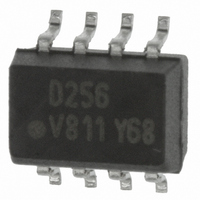ILD256T Vishay, ILD256T Datasheet - Page 6

ILD256T
Manufacturer Part Number
ILD256T
Description
OPTOCOUPLER PHOTOTRANS 2CH 8SOIC
Manufacturer
Vishay
Datasheet
1.ILD256T.pdf
(7 pages)
Specifications of ILD256T
Mounting Type
Surface Mount
Isolation Voltage
4000 Vrms
Number Of Channels
2
Input Type
AC, DC
Voltage - Isolation
4000Vrms
Current Transfer Ratio (min)
20% @ 10mA
Voltage - Output
70V
Current - Dc Forward (if)
30mA
Vce Saturation (max)
400mV
Output Type
Transistor
Package / Case
8-SOIC (3.9mm Width)
Forward Current
30 mA
Maximum Input Diode Current
30 mA
Output Device
Transistor
Configuration
2
Maximum Collector Emitter Voltage
70 V
Maximum Collector Emitter Saturation Voltage
400 mV
Maximum Forward Diode Voltage
1.55 V
Maximum Power Dissipation
300 mW
Maximum Operating Temperature
+ 100 C
Minimum Operating Temperature
- 55 C
No. Of Channels
2
Optocoupler Output Type
Phototransistor
Input Current
10mA
Output Voltage
70V
Opto Case Style
SOIC
No. Of Pins
8
Lead Free Status / RoHS Status
Lead free / RoHS Compliant
Current - Output / Channel
-
Current Transfer Ratio (max)
-
Lead Free Status / Rohs Status
Lead free / RoHS Compliant
Other names
751-1317-2
ILD256TGITR
ILD256TGITR
ILD256TGITR
ILD256TGITR
Available stocks
Company
Part Number
Manufacturer
Quantity
Price
Company:
Part Number:
ILD256T
Manufacturer:
PHILIPS
Quantity:
6 222
ILD256T
Vishay Semiconductors
OZONE DEPLETING SUBSTANCES POLICY STATEMENT
It is the policy of Vishay Semiconductor GmbH to
1. Meet all present and future national and international statutory requirements.
2. Regularly and continuously improve the performance of our products, processes, distribution and operating
It is particular concern to control or eliminate releases of those substances into the atmosphere which are known as
ozone depleting substances (ODSs).
The Montreal Protocol (1987) and its London Amendments (1990) intend to severely restrict the use of ODSs and
forbid their use within the next ten years. Various national and international initiatives are pressing for an earlier ban
on these substances.
Vishay Semiconductor GmbH has been able to use its policy of continuous improvements to eliminate the use of
ODSs listed in the following documents.
1. Annex A, B and list of transitional substances of the Montreal Protocol and the London Amendments respectively
2. Class I and II ozone depleting substances in the Clean Air Act Amendments of 1990 by the Environmental
3. Council Decision 88/540/EEC and 91/690/EEC Annex A, B and C (transitional substances) respectively.
Vishay Semiconductor GmbH can certify that our semiconductors are not manufactured with ozone depleting
substances and do not contain such substances.
unauthorized application, the buyer shall indemnify Vishay Semiconductors against all claims, costs, damages, and
www.vishay.com
6
expenses, arising out of, directly or indirectly, any claim of personal damage, injury or death associated with such
systems with respect to their impact on the health and safety of our employees and the public, as well as their
impact on the environment.
Protection Agency (EPA) in the USA
Parameters can vary in different applications. All operating parameters must be validated for each customer
application by the customer. Should the buyer use Vishay Semiconductors products for any unintended or
Vishay Semiconductor GmbH, P.O.B. 3535, D-74025 Heilbronn, Germany
We reserve the right to make changes to improve technical design
For technical support, please contact: optocoupler.answers@vishay.com
and may do so without further notice.
unintended or unauthorized use.
Document Number 83649
Rev. 1.6, 20-Apr-07









